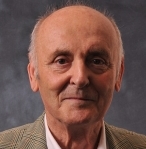Zoltán Benyó
He was a founding member of the Department of Process Control (later the Department of Control Engineering and Informatics, IIT) established at the Budapest University of Technology (BME) in 1964. With his activities, he played a major role in developing the educational and research profile of the department and in managing related work. His main areas of expertise were control engineering, measurement-based determination, computer simulation and identification of physiological processes, and medical informatics.
He was the head of the medical engineering (formerly medical-biological and measurement engineering) group of the department until his emeritus appointment, the founder of the BME Medical Informatics Laboratory, a member and leader of numerous domestic and international scientific associations. He was the spiritual father and organizer of the Biomedical Engineering program established within the framework of the cooperation between BME and Semmelweis University, and then its first leader, until its transformation into the MSc program in Health Engineering. His school-building ability is praised by the high number of his doctoral students and the many successful candidate and PhD theses completed under his leadership.
His life's work is inextricably intertwined with modern engineering education in Hungary. He participated with great competence and activity in the organization of prestigious domestic and international conferences, and his educational capacity is well known. Over the years, his students have received numerous domestic and international awards at the Scientific Student Association Conference (TDK).
As a result of his creative and managerial work, the 320-channel quality control system was designed, built and then put into operation in 1969-70, which was the first in the world to solve production control and regulation tasks with a procedure applied during production, and was patented in several countries. The new procedure developed here was later used in the design of intensive care units in hospitals. He is credited with developing and putting into production the first integrated circuit educational device family (LAB-LOG). These devices generated significant export revenue for our country (Austria, Germany, Mexico, Cuba, Algeria, etc.). On his initiative, the complex of 22 scientific and research laboratories of the University of Science and Technology in Oran (Algeria) was designed and implemented. 37 teachers and technicians from BME taught in these for several years. As a result of this successful cooperation, numerous educational methodologies from our country were "exported" to various other countries (Nigeria, Peru, Mexico, Cuba).
From the beginning, he has continuously participated in domestic and international research projects. Under his leadership, the computerized patient monitoring system was developed and implemented, in the development of which six university centers (Budapest, Bern, Munich, Prague, Vienna, Wroclaw) participated (INCO-COPERNICUS Project). An international jury awarded the project the highest degree of recognition.
He has more than 380 scientific publications; he is the author or co-author of 22 books (book chapters) written in Hungarian and foreign languages.
Awards: Excellence Award (1971, 1976); Ministerial Commendation (1974); For Excellent Work (1980); István Kruspér Memorial Medal (Measurement Technology and Automation Scientific Association, MATE, 1985); Frigyes Csáki Memorial Medal (MATE, 1989); Pro Scientia Award (National Scientific Student Association Council, OTDT, 1991); Rector's Commendation for TDK work (BME, 1992, 2006); Richárd Kolos Award (MATE, 1997); Pro Universitate et Scientia Award (2000); Albert Szent-Györgyi Award (Minister of Education, 2002); Academic Award (MTA, 2008); Middle Cross of the Hungarian Order of Merit (2014); Pro Universitate (Semmelweis University, 2015); Pro Facultate Award (BME, 2017).
- His legendary work ethic was well-known among his students, colleagues, and professional circles. He tirelessly sought to pass on his knowledge to his young colleagues and students.
- It maintained intensive relations with the universities of the Hungarian-populated regions of the surrounding countries (Kosovo, Ungvár, Cluj-Napoca, Târgu Mureș, Csíkszereda, Subotica, etc.).
- His selfless helpfulness was well known.
Created: 2020.07.09. 10:06
Last modified: 2025.03.25. 14:18

